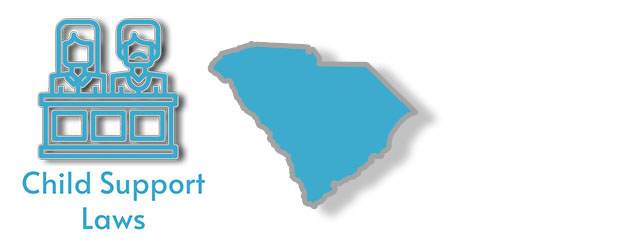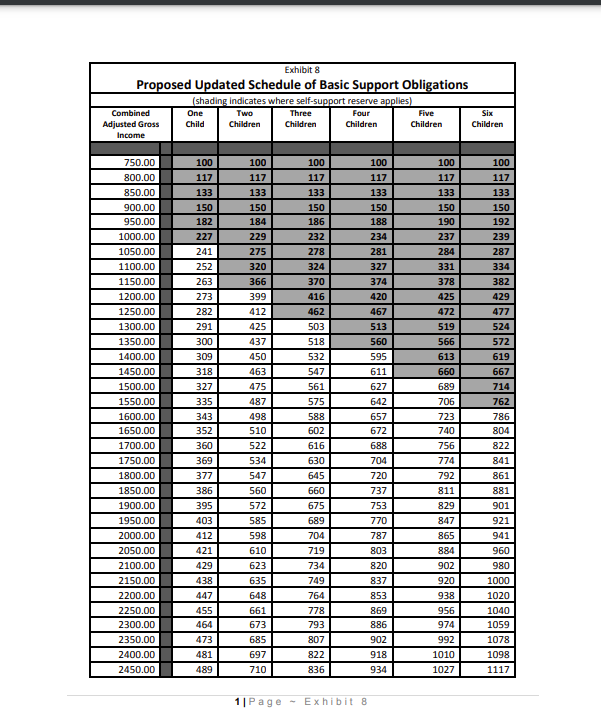
Everything you need to know about South Carolina child support laws, updated for 2020.
South Carolina child support laws, according to the DSS, aim to create a system where children can count on their parents for the emotional and financial support necessary for a healthy and successful life.
South Carolina child support laws, according to the DSS, aim to create a system where children can count on their parents for the emotional and financial support necessary for a healthy and successful life.
How to apply for child support in South Carolina
The SCDSS (South Carolina Department of Social Services) has announced that in 2021. The state of South Carolina will launch a customer service portal that will allow parents to create accounts that will give them access to support services such as paternity establishment, Support order modification, and so on.
That said.
To apply for services today (2020), you must first, download the Custodial Parent’s Application for Child Support Service here.
What to remember:
- In South Carolina, the DSS offers child support services through the CSSD (Child Support Services Division).
- The CSSD provides support services including NCP (non-custodial parent location), paternity establishment, support order establishment, support order enforcement, and review and modification of support orders.
- The CSSD does not handle visitation and custody claims.
- The CSSD may close your case for failure to communicate.
- South Carolina Center for Fathers and Family program offers education services to fathers in the state.
How is paternity established in South Carolina?
According to South Carolina Child Support Laws, if a child is born out of wedlock, then the father has no legal rights or connections to the child until he establishes legal paternity.
In contrast, when a child is born to a married couple, the law automatically assumes that the man is the father.
Generally, there are two ways to establish paternity in South Carolina. one is voluntary application, and the other is involuntary. That means if you sign the AOP (Acknowledgement of Paternity) Form at the hospital, then the law assumes that you are the father.
Whereas, the involuntary establishment of paternity is when one parent petitions the DSS or courts for a test.
what to remember:
- The father has no legal visitation rights until he establishes paternity.
- If you are unsure of the child’s paternity, do not sign the Acknowledgement of Paternity form at the hospital. Instead, enroll in the Responsible Father Registry.
- The responsible father registry protects your rights as a father should the child be placed for adoption.
- You may also sign the AOP form at the County Health Department offices or State Office of Vital Records for a small fee.
- The DSS, through the courts, offers paternity tests for free. Apply for paternity services here.
Locate DSS offices and contact information here.
How is child support determined in South Carolina?
South Carolina child support formula is based on the gross income(s) of both parents (excluding benefits received from public assistance programs such as TANF or SSI, or food stamps), alimony, the number of children subject to support action, health insurance, child care costs, and custody arrangement.
However, the judge may deviate from this formula if the child has significant income or on the following grounds:
- Equitable distribution of property.
- Extraordinary education expenses including-private or specialized school fees.
- Extraordinary medical expenses.
- Families with more than six children.
- Low income or high-income households.
How to calculate child support in South Carolina
The DSS provides south Carolinians a child support calculator that you can use to estimate your obligation. You may also obtain child support worksheets and South Carolina Child Support Guidelines Schedule at the local Clerk of Court Office in your area.
South Carolina Support Guideline schedule (see the snippet below) is a table the judge uses to allocate basic support obligation. The idea is, use the calculator or worksheet then locate the resulting figure on the table.

PAGE 1: South Carolina Support Guideline schedule
The schedule also includes:
- Worksheet A, Child Support Obligation.
- Split Custody Worksheet, worksheet B.
- And parental time estimation.
Download South Carolina Support Guideline schedule plus worksheets here.
What to remember:
- South Carolina uses the Income Shares Model in awarding parental obligation.
- The judge may deviate from South Carolina child support guidelines if the resulting amount is inappropriate or if it does not serve the best interests of the child(ren).
- South Carolina Child Support Guidelines provide a case by case determination if the combined gross income(s) of both parents is less than $750. The same applies if the combined gross income(s) is higher than $30000.
- If the parent is voluntarily unemployed or underemployed, the court will impute income. Meaning, your obligation will be the same as when you are working at full earning capacity.
How to modify child support in South Carolina
Under South Carolina child support guidelines, there are two ways to request a support order change. One is through the CSS (Child Support Services) Office, and two, via the family court.
How does it work:
- The petitioning parent sends a written request to the CSS or calls 1-800-768-5858.
- You may also hire an attorney to pursue support order changes on your behalf.
- After receiving the request for modification, the CSS will review it, and the result will either be approval or denial.
Typically, it takes six months for CSS/administrative approval and two to four months for judicial modifications. Also, you must have a good or a reasonable reason to petition for modification. What do I mean?
The law requires parents in South Carolina to prove “A substantial change” in circumstances to win support order modification. A change in circumstances could be any scenario where your income decreases or increases significantly. For example, job loss, reduced work hours, a mental or physical disability, and so on.
Therefore, consult with a family court attorney in your area to see if your situation qualifies for modification.
In general, to request modification:
- Download SCCA 400.29 SRL CSM Order-Decrease Child Support or the appropriate form here.
- If you chose to represent yourself, use the Self Represented Litigant section.
- If you hire an attorney, he or she will guide you through the process.
What to remember:
- Parents can agree to a modification and sign a “consent order” to avoid the court or DSS process.
- Parents who take the judicial route may have to pay a $150 service fee.
What happens if you do not pay child support in South Carolina?
Traditionally, the CSS and South Carolina Courts utilize income withholding, state tax offsets, and ‘rule to show’ cause when enforcing child support. However, the law does not limit the courts and CSS to the listed collection actions. That means delinquent parents in the state may also face:
- License revocation: if the amount of back support you owe surpass $500, the CSS through other state agencies may suspend your professional, business, occupational, or driver’s license.
- Income tax refund offset: the CSS may intercept the paying parent’s state, local, or federal taxes.
- Unemployment benefits intercept: the CSS may also collect child support from the paying parent’s income benefits-including unemployment.
- Financial institution lien: the CSS may place a lien on the bank accounts/financial institution accounts of parents owing more than $1000.
- Insurance lien: your life insurance, general liability, workers’ compensation, auto bodily harm liability, and directors and officer’s liability insurance are subject to insurance liens if you owe more than $1000.
- Passport denial: through the department of state, the CSS may deny or revoke the paying parent’s passport.
What is “a rule to show cause” hearing in SC?
Just like contempt of court hearings, a rule to show cause happens when you fail to honor your parental obligation prompting the judge to summon you to explain your failure.
What usually happens at such hearings is, the judge listens to both parties, and if the defending parent cannot give a good reason for his/her failure. Then the judge may order any of the listed enforcement actions above. The judge may also;
- Fine the parent $1500 or sentence him/her for up to a year, or in some cases both.
- In cases where the parent has a valid excuse, the judge may offer alternatives such as modifications.
- Failure to appear for a hearing will lead to a bench warrant, thus you will be subject to arrest at any time.
How do I stop child support payments in South Carolina?
Parents in South Carolina must pay child support until the child graduates’ high school or turns 18. That means your obligation may continue until the child is 19, or indefinitely if the child is mentally or physically disabled.
For parents worried about higher education tuition costs, you may sign an agreement with your partner to extend support through college or university. But remember, such agreements are only enforceable if legal.
A legally binding agreement must contain an offer and acceptance, mutuality of intention, legality, capacity, and consideration. Also, a third-party witness, preferably an attorney or notary public, must be present during the signing.
Emancipation laws in South Carolina
South Carolina does not have rules and procedures for emancipation, however, children in the state may get emancipated through marriage, parental consent, or by joining the US military.
More South Carolina Laws
- Murder Sentencing Guidelines – Minimum to Maximum for Every State
- South Carolina Car Seat Laws
- South Carolina Child Support Laws
- South Carolina Hit and Run Laws
- South Carolina Lemon Law
- South Carolina Recording Laws
- South Carolina Sexting Laws
- South Carolina Statute of Limitations
- South Carolina Whistleblower Laws